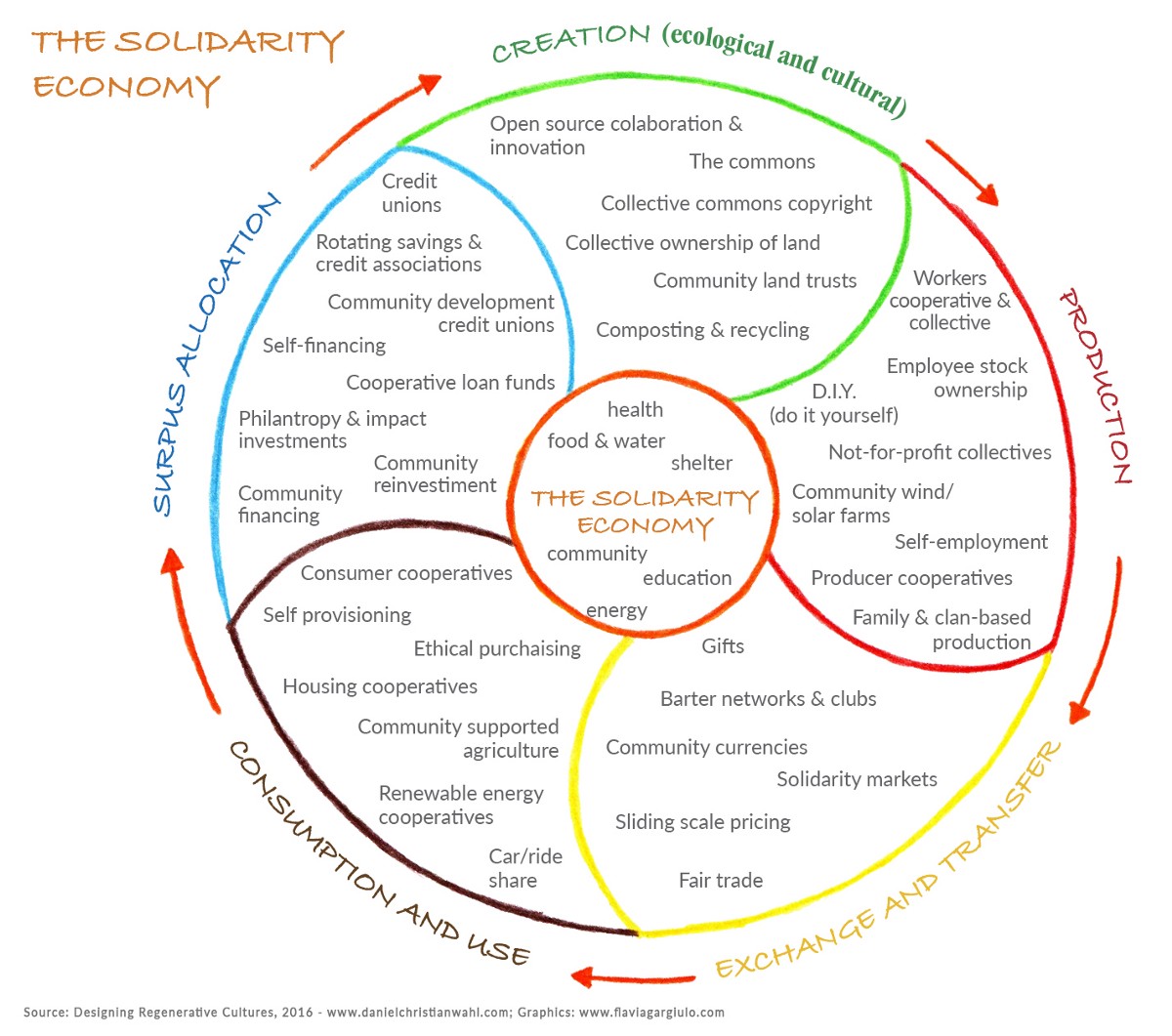
By Kenzie Love
Strengthening ties to the social and solidarity economy (SSE) is a key part of CWCF’s strategic plan. But what exactly is the SSE, how do worker co-ops fit into it, and how can they best collaborate with it? And what about social enterprises? Here’s a start at answering these questions.
What is the solidarity economy?
As Emily Kawano observes, “defining the solidarity economy can be challenging. Definitions vary across place, time, politics, and happenstance, though there is increasingly a broad common understanding.” Although, as Kawano notes, there is some variation on how the principles of the solidarity economy are articulated, the U.S. Solidarity Economy Network uses these five principles:
- solidarity, cooperation, mutualism
- equity in all dimensions (e.g., race, ethnicity, nationality, class, and gender, etc.)
- participatory democracy
- sustainability
- pluralism
In accordance with these principles, the solidarity economy seeks to create an economic system based on collaboration — or solidarity — rather than a competitive, profit-motive driven one, and sees this also resulting in major changes to not just the economy but also to government and society.
Jason Spicer of the University of Toronto defines the solidarity economy this way:
“It is an economy that puts people, and I would say planet, before profits, it’s an economy that operates on a different logic than the classic business model, and that involves having enterprises and organizations that are operating within it being governed and owned in a different way.”
What is the social economy?
Like the solidarity economy, the social economy lacks a single definition. The Canadian CED Network (CCEDNet), however, has adopted the definition used by the Chantier de l’économie sociale in Quebec, which defines the social economy as being made up of association-based economic activities founded on values of:
- Service to members or the community rather than only generating profits and seeking financial returns;
- Autonomous management (not government controlled);
- Democratic decision making;
- Primacy of persons and work over capital;
- Based on principles of participation, empowerment and individual and collective responsibility.
The Social Economy includes all co-operatives, as well as associations and mutuals. Although all co-ops fit into the Social Economy, not all co-ops are keen on this understanding, because some are quite conservative. In contrast to the radical change envisioned by the solidarity economy, the social economy sees itself as complementing mainstream institutions, and it generally accepts the “rules of the game” of the capitalist system.
What is social enterprise?
According to Gabriel Salathé-Beaulieu, “social entrepreneurship has multiple, sometimes conflicting, definitions, but at its core is the idea of ‘doing business for good.’ Hence, a social enterprise is different from a regular business because it does not only seek profit. Yet, it is also different from the non-profit, charity and voluntary sectors because it needs to achieve its social mission through economic activities that do generate profit.” While social enterprises do have a social mandate, however, they are not necessarily keen on democratic decision-making, workers’ rights, or working conditions.
How can worker co-ops best collaborate with the social and solidarity economy and social enterprises?
Perhaps the starting point for worker co-ops wishing to work with other members of the social and solidarity economy is to identify the commonalities that exist with both. The seven co-op principles have much in common with those adhered to by the social and solidarity economies, among them those of open and voluntary membership, democratic decision-making, and concern for community. Worker co-ops will not necessarily fit with everything happening in the SSE, but in general they do fit well. On the other hand, social enterprises do not easily fit with worker co-op principles due to the lack of democratic accountability, and lack of attention to how much the social entrepreneur and the workers are paid.
Worker co-ops in Scotland use two distinct terms: Co-operation for the application of principle 6 (co-operatives helping co-operatives), and Collaboration, where they work with other organizations as long as they agree to shared principles. These could be others in the Social Economy, Social Enterprises, even for-profit companies.
One very interesting point made by Sonja Novkovic who spoke on this topic at the last CWCF Conference, is this. The Solidarity Economy is basically the Social Economy, with the additional element that it seeks to transform the economic system.
Worker co-ops want to be seen as part of the Social and Solidarity Economy. By making the worker co-op model better known in the rest of the SSE and among Social Enterprise advocates, there is an opportunity to transform the economy to meet the needs of working people and bring democracy to the workplace.